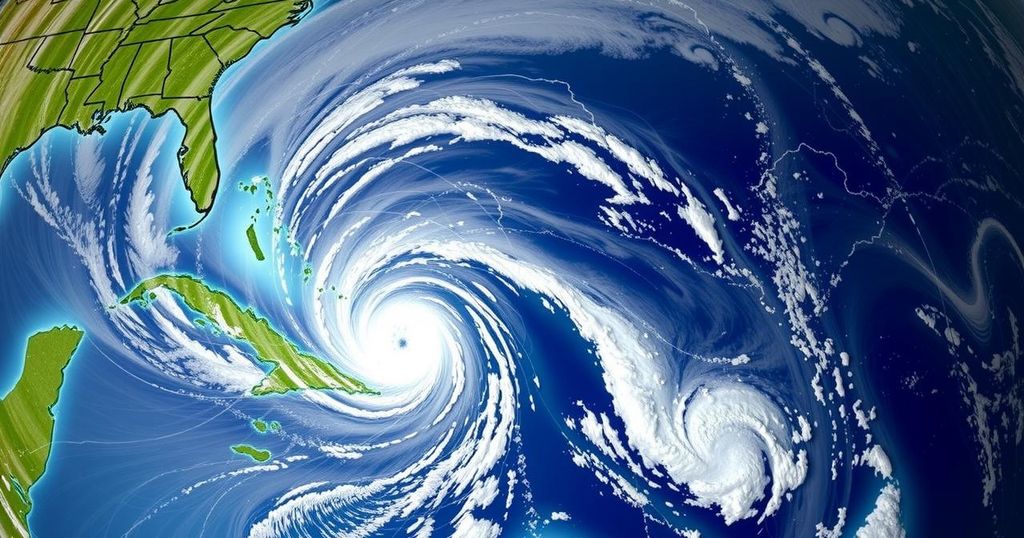Weather
World news
AFRICA, BRIAN MCNOLDY, CARRIACOU, CUBA, EVACUATIONS, GULF OF MEXICO, HURRICANE, HURRICANE SEASON, KATE, MCNOLDY, MILTON, NATIONAL HURRICANE CENTER, NATURAL DISASTER, NATURAL DISASTERS, NORTH AMERICA, OSCAR, SOUTH AFRICA, U. S, UNIVERSITY, UNIVERSITY OF MIAMI, VIRGINIA
Aisha Khan
0 Comments
2024 Atlantic Hurricane Season Concludes with Unprecedented Activity
The 2024 Atlantic hurricane season ended with 11 hurricanes, significantly impacting the U.S. Gulf Coast and beyond. Historical storms included Hurricane Beryl, a Category 4 hurricane in June, and Hurricane Helene, one of the deadliest since Katrina, causing widespread destruction and loss of life. The season was marked by unusually warm ocean temperatures influencing storm formation and intensity, raising concerns about the future of hurricane activity linked to climate change.
The 2024 Atlantic hurricane season concluded on Saturday, with a total of 11 hurricanes observed, surpassing the average of seven. This season’s storms resulted in significant devastation far beyond their points of impact on the U.S. Gulf Coast, prompting meteorologists to describe it as an exceptionally active one due to warmer ocean conditions. Among the storms, eight made landfall in locations including the U.S., Bermuda, Cuba, the Dominican Republic, and Grenada.
Hurricane Beryl marked a historical event as the first recorded Category 4 hurricane to develop in June, impacting the island of Carriacou in Grenada. It subsequently wreaked havoc in Jamaica, destroying homes and crops and resulting in two fatalities. This marked a rare occurrence, as the previous Category 4 hurricane to affect Jamaica was Dean in 2007. Furthermore, Beryl also became the earliest recorded Category 5 hurricane in the Atlantic, achieving this intensity on July 1, a time by which hurricanes of such magnitude are typically not expected to appear according to the National Hurricane Center’s data.
In September, Hurricane Helene struck the southeastern United States, causing tremendous destruction and resulting in over 200 lives lost, marking it as the deadliest storm to hit the U.S. mainland since Hurricane Katrina in 2005. North Carolina alone reported damages upwards of $48.8 billion, with extensive destruction to residential properties, drinking water infrastructures, and agricultural lands across multiple states including Florida, Georgia, South Carolina, Tennessee, and Virginia.
October witnessed Hurricane Milton, which swiftly escalated to 180 mph, making it one of the strongest hurricanes recorded by wind speed in the Gulf of Mexico, closely rivaling Hurricane Rita from 2005. The rainfall in regions affected by Helene and Milton during September and October also exceeded normal levels, with areas like Asheville, Tampa, and Orlando reporting record precipitation.
Hurricane Rafael emerged in November, achieving speeds of 120 mph and nearing the record for the strongest November hurricane in the Gulf of Mexico, matching Hurricane Kate from 1985. Rafael encountered Cuba as it struggled to recover from the outages caused by Hurricane Oscar in October. Meteorologist Brian McNoldy noted that the abnormally warm ocean temperatures facilitate the formation of hurricanes at unexpected times and locations. He stated, “In other words, we never had a storm as strong as Beryl so early in the season anywhere in the Atlantic and we never had a storm as strong as Milton so late in the season in the Gulf of Mexico.” He added, “I do not ever point to climate change as causing a specific weather event, but it certainly has its finger on the scale and makes these extreme storms more likely to occur.”
The Atlantic hurricane season traditionally runs from June 1 to November 30, during which tropical storms and hurricanes form and move across the Atlantic Ocean. The number of storms varies annually, influenced by several climatic factors, especially ocean temperatures. An increase in ocean temperatures often leads to more intense and numerous storms. This particular season has garnered attention due to the record-breaking early and late-season hurricanes, as well as the extent of their impacts on various regions, emphasizing the potential future implications of climate change on hurricane patterns and intensity.
In summary, the 2024 Atlantic hurricane season was characterized by an above-average number of hurricanes, including significant events like Hurricane Beryl and Hurricane Helene that resulted in substantial destruction and loss of life. The season’s hurricanes not only caused devastation directly but also presented a concern regarding their formation and strength in non-typical timeframes, suggesting that climate change may play a role in shaping future hurricane activity.
Original Source: nsjonline.com




Post Comment